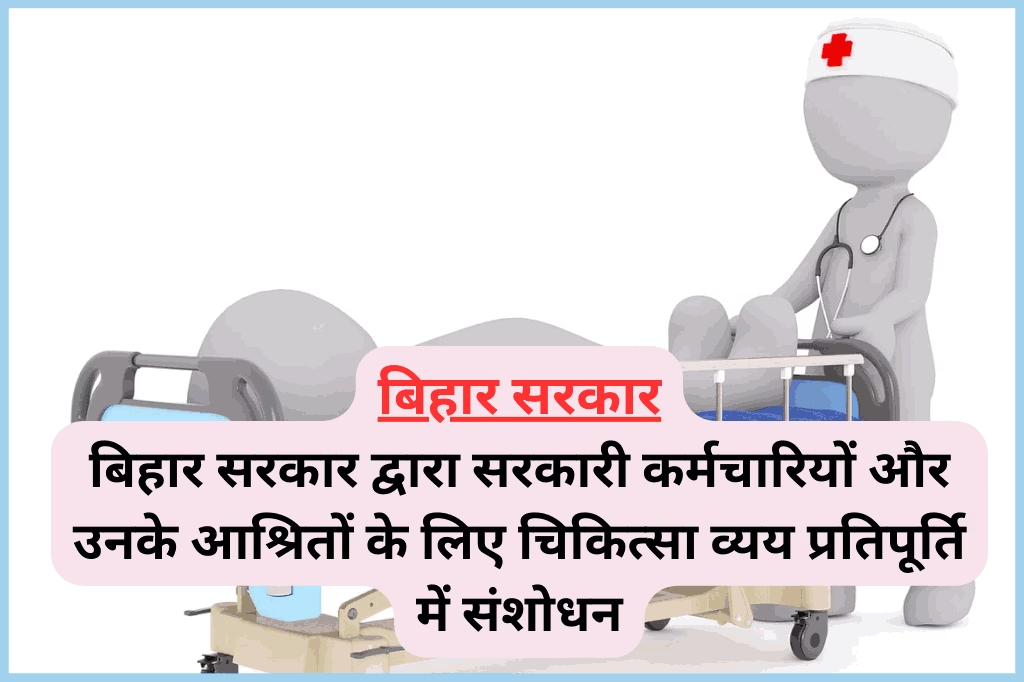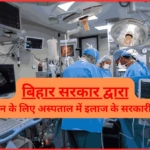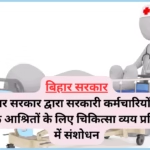On March 12, 2025, we have entered an era where governments are dedicated to the welfare of their employees and citizens. In this direction, the Bihar government has made significant changes in the process of reimbursement of medical expenses for its subordinate employees and their dependents. This decision, which was issued by the Health Department on June 27, 2024 under No.-14 / Miscellaneous-05 / 2021, not only eases the administrative process but also aims to provide faster assistance to employees. Let us know the various aspects of this decision in detail and see how it can affect the lives of Bihar government employees.
Objective and Background of the Decision
The Bihar government has always given high priority to the health of its employees. As per the earlier rules, vide Health Department’s Decision No. 946(14), dated August 14, 2015, the maximum limit for reimbursement of medical expenses of state subordinate employees and their dependents was Rs 50,000. The amount was sanctioned by the Civil Surgeon of the concerned district, who, after evaluating the authenticity and validity of the medical bills, proposed the same to the Controlling Officer. Subsequently, Decision No. 1462(14), dated August 16, 2021 retained this limit, but a change was felt to be necessary in view of the requirements of the time.
Through the new decision, the government has tried to make the process of reimbursement of medical expenses more effective. Its main objective is to settle the claims of employees quickly, eliminate unnecessary delays and dissolve administrative complexities. This step will not only bring convenience to the employees, but also reflects the government’s commitment towards health services.
New Amendments: What Changed?
The new resolution has made two major changes in the limit and approval process of medical expense reimbursement. These changes are as follows:
1. Limit from Rs 50,000 to Rs 1,00,000
- While earlier the approval of medical bills up to Rs 50,000 was with the civil surgeon, now this limit has been increased to Rs 1,00,000. This means that now the civil surgeon of the concerned district will check and countersign the bills up to Rs 1 lakh and send it to the controlling officer.
- This change is a big relief for the employees, as the limit of Rs 50,000 was becoming insufficient amid the rising cost of health services.
2. New system for bills above Rs 1,00,001
- For medical expenses above Rs 1 lakh, now a three-member committee will be constituted under the chairmanship of the superintendent of the concerned medical college or hospital. On the recommendation of this committee, the officer of the administrative department (Additional Chief Secretary, Principal Secretary, or Secretary) will give final approval.
- This process ensures transparency and accountability, as well as speeds up settlement of large claims.
Regional Allocation: Who is Responsible Where?
The new resolution assigns regional responsibility to medical colleges and hospitals for scrutiny and approval of medical expense bills. The arrangement is as follows:
1. Patna Medical College Hospital (PMCH), Patna
- Patna district of Patna division.
- Bhojpur, Buxar, Rohtas, and Kaimur districts of Patna division.
2. Srikrishna Medical College Hospital, Muzaffarpur
- Tirhut division.
3. Darbhanga Medical College Hospital, Darbhanga
- Darbhanga division.
4. Anugrah Narayan Magadh Medical College Hospital, Gaya
- Magadh division (Aurangabad, Gaya, Jehanabad, Arwal).
5. Jawaharlal Nehru Medical College Hospital, Bhagalpur
- Bhagalpur division.
6. Nalanda Medical College, Pawapuri
- Nalanda of Patna division and Nawada of Magadh division.
7. Jainagar Medical College Hospital, Madhubani
- Kosi division.
8. Bettiah Medical College Hospital, Bettiah
- West Champaran Division.
If the concerned department is not available in any medical college, then the superintendent of Patna Medical College Hospital will check these bills. This arrangement ensures that employees from every area get the nearest facility and there is no delay in the process.
Three-Member Committee: The Basis of Transparency and Speed
A three-member committee will be formed in every medical college hospital under the chairmanship of the superintendent. This committee will include:
- The head of the department of medicine.
- The head of the department of surgery.
- If required, the superintendent can include other department heads as special invitees.
This committee will meet twice a week and check the eligibility and correctness of the bills. After checking, these bills will be sent to the administrative department of the concerned employee. This system is not only transparent but will also help in providing quick relief to the employees.
Amendments to Old Rules
This new resolution amends the previous resolutions (946(14), August 19, 2015; 997(14), August 28, 2015; and 1462(14), August 16, 2021). This resolution will be deemed effective from the date of issue (June 27, 2024). The Health Department has also been empowered to make further changes in this process, so that flexibility is maintained in future if needed.

This new resolution amends the previous resolutions (946(14), August 19, 2015; 997(14), August 28, 2015; and 1462(14), August 16, 2021). This resolution will be deemed effective from the date of issue (June 27, 2024). The Health Department has also been empowered to make further changes in this process, so that flexibility is maintained in future if needed.
Benefits for Employees
- Increased limit: Bills up to Rs 1 lakh can now be approved easily, which will provide relief to employees for minor treatment.
- Quick execution: Three-member committee and regional allocation will expedite settlement of claims.
- Transparency: Committee-based investigation will increase accountability in the process.
- Facility: Different medical colleges will be responsible for each division, so that employees will get facilities in their area itself.
Impact on Society and Administration
This resolution is a positive step not only for the employees but also for the entire administrative system. Ensuring access to health services and financial assistance will boost the morale of the employees, which will also impact their efficiency. Also, this step reflects the thinking of the Bihar government, in which employee welfare is being given priority.
This new decision of the Bihar government is a positive initiative. Raising the reimbursement limit of medical expenses and simplifying the process will not only be beneficial for the employees but it will also increase the government’s commitment towards healthcare services. This change is not only a sign of administrative reform but it also shows that the government stands with its employees.


